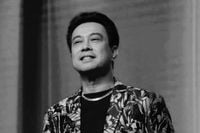Hajji Alejandro, the beloved figure known as the “Kilabot ng mga Kolehiyala,” has passed away at the age of 70 following a courageous battle with stage 4 colon cancer. His family confirmed his death on April 22, 2025, just a day after he succumbed to complications from the illness.
The news of Alejandro's passing comes as a heavy blow to the Philippine music community, which has already been mourning the recent losses of other legends, including Asia’s Queen of Songs, Pilita Corrales, and Superstar Nora Aunor. Alejandro’s family released a statement expressing their sorrow and requesting privacy during this difficult time. “It is with deep sorrow that we announce the passing of our beloved Dad and Son, Angelito ‘Hajji’ T. Alejandro,” the statement read. “We appreciate your understanding and support during this difficult time. To God be the glory.”
Hajji Alejandro, born Angelito Toledo Alejandro on December 26, 1954, in Alaminos, Pangasinan, rose to fame in the 1970s as the original lead vocalist of the Circus Band, a pioneering group that helped shape the live music scene in Manila. His career took off in 1978 when he performed “Kay Ganda ng Ating Musika,” a composition by National Artist Ryan Cayabyab, which won the inaugural Metro Manila Popular Music Festival (Metropop). This song became a cultural milestone, marking the beginning of what is often referred to as the golden age of Original Pilipino Music (OPM).
Hajji’s smooth vocals and emotionally resonant ballads, including hits like “Nakapagtataka,” “Panakip Butas,” and “Tag-araw, Tag-Ulan,” earned him the title of “Kilabot ng mga Kolehiyala,” capturing the hearts of college students across the Philippines. His music not only resonated with fans but also inspired a new generation of artists to embrace and promote Filipino music.
In January 2025, Alejandro began experiencing health issues during a trip to Vigan, where he suffered from bloating and shortness of breath. Subsequent tests revealed advanced colon cancer, leading to emergency surgery in February. Despite complications from his condition, including seizures and infections, there was hope for recovery. In early April, his daughter Rachel Alejandro reported that her father had started singing again, a sign that gave fans and family optimism.
However, the battle against cancer proved to be too much. Alejandro died peacefully at home, surrounded by loved ones, including his longtime partner Alynna Velasquez, who had been by his side throughout his illness. Velasquez had publicly disclosed his condition in March, revealing the challenges they faced during his treatment.
Hajji Alejandro’s personal life was marked by both triumph and tragedy. He was married twice; his first marriage to Myrna Demauro produced two daughters, Rachel and Barni Alejandro, while his second marriage to actress Rio Díaz brought forth a son, Ali Alejandro, who became the drummer for the band DeLara. Tragically, Díaz passed away from colon cancer in 2004. He also had another daughter, Michelle Alejandro. Throughout his life, Alejandro remained close to his children, sharing his passion for music with them.
In his later years, Alejandro continued to perform and participate in tribute concerts, showcasing his enduring influence in the music industry. He toured frequently with fellow OPM legends such as Rico J. Puno, Rey Valera, Nonoy Zuñiga, and Marco Sison as part of the retro pop group Hitmakers. His contributions to music spanned decades, and his songs remain a cherished part of the Filipino musical canon, often reinterpreted by younger artists.
His daughter Rachel, who followed in his footsteps as a singer and theater artist, often joined him on stage, further solidifying the family’s musical legacy. In a heartfelt tribute, Rachel expressed her love for her father, reflecting on the deep bond they shared through their passion for music.
Hajji Alejandro’s impact on Philippine music is undeniable. His signature song, “Kay Ganda ng Ating Musika,” not only won awards domestically but also gained international recognition, further cementing his place in the hearts of fans worldwide. The song’s themes of love and national pride resonate deeply with Filipinos, making it an anthem that transcends generations.
As fans and fellow artists bid farewell to Hajji Alejandro, they do so with a sense of gratitude for the joy and inspiration he brought to their lives. His music will continue to be celebrated, echoing through the hearts of many who grew up listening to his timeless ballads. The sorrow felt at his passing is mirrored in the poignant lyrics of his songs, encapsulating the profound connection he forged with his audience.
In his final moments, surrounded by family and friends, Alejandro’s legacy as a pioneer of OPM and a beloved entertainer remains intact. His contributions to music have left an indelible mark on the Philippine cultural landscape, ensuring that his spirit will continue to live on through the melodies that have touched countless lives.
Hajji Alejandro’s journey may have come to an end, but the echoes of his voice and the warmth of his songs will linger on, reminding us of the beauty of Filipino music and the power it holds to unite and inspire.









